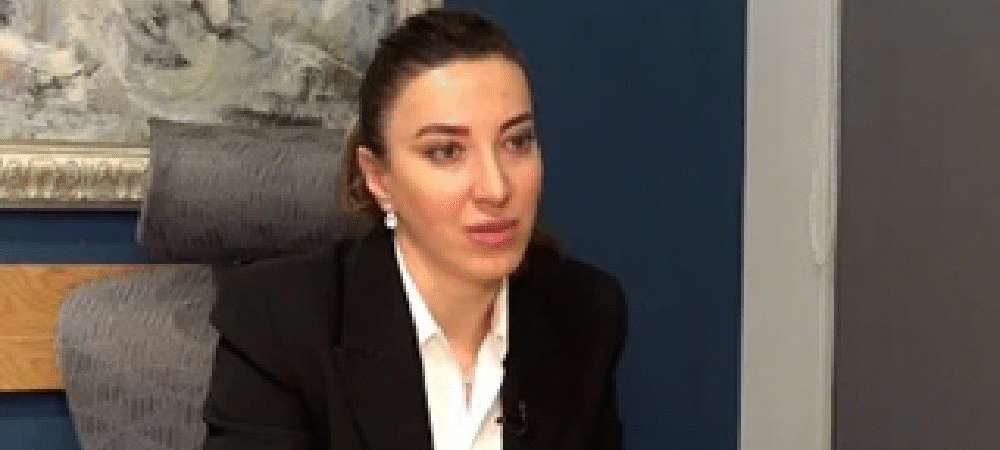Interview with Siranush Sahakyan, Legal Representative of Armenian Prisoners’ Interests at the European Court of Human Rights
= Ms. Sahakyan, yesterday, a statement was released by Ruben Vardanyan’s local lawyer, Avraam Bermani, regarding the indictment against Vardanyan. Since this is the first time such a statement has been made, how would you assess this phenomenon in general, and what is the main message of the declaration?
First, I would like to emphasize that the publication of this statement is in itself an unprecedented move. In Azerbaijan, the legal community operates under constant pressure, and the violations must be so glaring that lawyers feel compelled to speak out about the issues within the judicial system. Therefore, this statement itself highlights the desperate situation that lawyers face when trying to organize the defense of their clients in Azerbaijan.
Of course, it should be noted that the statement is quite measured and highly professional. It does not contain direct criticism of the authorities, and it is clear that the lawyer has stayed within the professional framework, avoiding any potential further reprisals.
To summarize, this statement is essentially about the fact that the charges against Vardanyan are entirely unfounded. There are no facts that could even remotely be considered criminal acts, and there is no basis for a criminal conviction in Ruben Vardanyan’s case. The actions that are being classified as criminal offenses are an inevitable part of everyone’s activities, and if these actions were to be legally classified as crimes, then each of us could be charged. In other words, for the “crimes” Ruben Vardanyan is accused of, any one of us could be charged.
The statement also touches upon the issue of individual responsibility. It is important to note that the entire accusation is based on the fact of Artsakh’s self-declaration of independence. The actions of the Artsakh authorities are fully analyzed here, and the declaration of independence is classified as an illegal activity. As a result, they are trying to impose legal consequences on all Armenians who have, to some extent or at a particular time, participated in the administration of the Republic of Artsakh.
This directly contradicts the fundamental principle of individual responsibility. In this case, individuals are being held accountable for the legal activities of the people of Artsakh, even though they have not personally engaged in any criminal activity.
What is also noteworthy is that the humanitarian work carried out in the unrecognized Republic of Artsakh is being classified as criminal conduct. If we follow this logic, even the International Committee of the Red Cross, which has conducted humanitarian work in Artsakh, could face criminal threats.
The lawyer clearly states that criminal acts are strictly defined in the criminal code. If we evaluate Ruben Vardanyan’s actions separately, they do not fall under any criminal framework. This is why the criminal charges lack specificity and a concrete foundation.
= The defense lawyer also mentions procedural violations in the trial.
Yes, the statement specifically emphasizes the issue of defending the accused. Of course, the lawyer has repeatedly raised concerns about the limitations on the right to a defense during previous court sessions. For example, the defense was denied access to the full extent of the charges or the necessary tools to organize an effective defense (such as internet access, the ability to take notes, or the ability to present didactic materials). These were fundamental needs that the defense was deprived of. A broader issue also concerns the rejection of defense motions. In this case, we don’t see the principles of fair competition and equality before the law being upheld. It seems as though the prosecution is operating from a dominant position in the trial, with its motions fully accepted, thus predetermining the outcome of the trial. Meanwhile, the defense is not only denied the opportunity to present motions but is also unable to have any of those motions accepted, which directly impacts the exercise of the right to defense.
But here, I believe this is not the only violation. The presumption of innocence is also being disregarded, and issues such as obtaining proper translation and other procedural guarantees are being neglected.
To summarize, the core message of the statement is that there are no real charges, no tangible actions behind the accusations, and that the trial is not focusing on the individuals’ actual conduct but rather abstract issues related to the conflict. Moreover, the entire trial has been marred by multiple violations of the guarantees of a fair trial.
= It seems that the charges against Ruben Vardanyan contradict both international conventions and Azerbaijan’s own criminal code. Is that correct?
Yes, you are correct. Because there is no specific act attributed to him that would pose a public danger. In other words, the trial is not addressing Ruben Vardanyan’s concrete actions but rather a general situation. For example, Artsakh’s right to self-determination and the activities of its self-declared authorities are being classified by Azerbaijan as illegal actions. However, Azerbaijan has failed to point to specific actions that Vardanyan allegedly committed, actions that could potentially constitute criminal offenses. For instance, they cannot demonstrate that he issued illegal orders at a particular time and place, or that his involvement led to the loss of life. No such specific acts have been identified.
The charges are addressing a general situation, and an attempt is being made to place the responsibility for this situation on Ruben Vardanyan, which is unacceptable under both international law and Azerbaijani criminal law. A person cannot be held accountable for a collective or generalized set of actions. They can only be charged for specific acts that are proven to have been committed by that individual.

